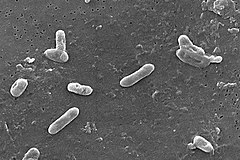Bordetella bronchiseptica
| Bordetella bronchiseptica | |
|---|---|
 |
|
| Scanning electron micrograph of B. bronchiseptica | |
| Scientific classification | |
| Kingdom: | Bacteria |
| Phylum: | Proteobacteria |
| Class: | Beta Proteobacteria |
| Order: | Burkholderiales |
| Family: | Alcaligenaceae |
| Genus: | Bordetella |
| Species: | B. bronchiseptica |
| Binomial name | |
|
Bordetella bronchiseptica (Ferry 1912) Moreno-López 1952 |
|
| Bordetella bronchiseptica | |
|---|---|
| Classification and external resources | |
| ICD-10 | A37.8 |
| ICD-9-CM | 033.8 |
Bordetella bronchiseptica is a small, Gram-negative, rod-shaped bacterium of the genus Bordetella. It can cause infectious bronchitis in dogs and other animals, but rarely infects humans. Closely related to B. pertussis—the obligate human pathogen that causes pertussis (whooping cough); B. bronchiseptica can persist in the environment for extended periods.
Humans are not natural carriers of B. bronchiseptica, which typically infects the respiratory tracts of smaller mammals (cats, dogs, rabbits, etc.). People are more likely to be infected by B. pertussis or B. parapertussis. Unlike B. pertussis, B. bronchiseptica is generally resistant to macrolide antibiotics. It is also generally resistant to cephalosporins. Some human cases have been successfully treated with trimethoprim/sulfamethoxazole and fluoroquinolones.
B. bronchiseptica does not express pertussis toxin, which is one of the characteristic virulence factors of B. pertussis, but it has the genes to do so, highlighting the close evolutionary relationship between the two species.,
In veterinary medicine, B. bronchiseptica leads to a range of pathologies in different hosts. It is a serious disease of dogs, pigs, and rabbits, and has been seen in cats, horses, and seals. A PCR test for the pathogen exists.
In pigs, B. bronchiseptica and act synergistically to cause atrophic rhinitis, a disease resulting in arrested growth and distortion of the turbinates in the nasal terminus (snout).
...
Wikipedia
